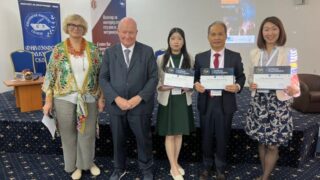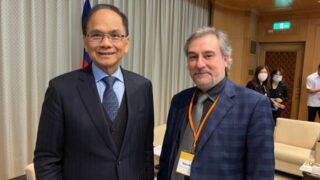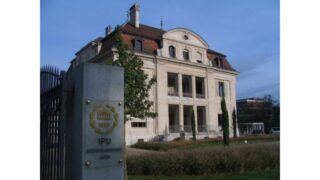What happened to Tai Ji Men raises serious doubt on whether laws are respected in Taiwan when dealing with taxpayers.
by Huang Kun-Kuang*
*A paper presented at the conference “Looking at the Development of Human Rights in Taiwan from the February 28 Incident and the White Terror to the Tai Ji Men Case,” hosted by the National Memorial Hall of February 28 and the Taiwan Association for Financial Criminal Law Study, Taipei, ROC, March 5, 2023.


A democratic government under the rule of law puts the people first, and the exercise of political power must be governed in accordance with the law. Those who exercise public power cannot rule the people based on “heroic” ideas and conduct extrajudicial governance wantonly, leading to tyranny.
In the past, the erection of monuments was a way for the government to praise good governance and upright folk customs. Now, it is a way to admit wrongdoing, compensate for the government’s tyranny, and heal the pain. In the past two years, I have been lucky enough to participate in the inauguration of three nearby monuments. Among them, the 228 Peace Monument was built with money by all taxpayers, and the Dr. Chen Wen-Chen Monument on the National Taiwan University campus was built with donations. I contributed myself a little bit. On December 19 last year, the Monument for the Legal and Tax 228 at the Swiss Mountain Villa was built independently by Tai Ji Men, and I was on the spot. I hope to participate in another inauguration this year, of a monument for the vindication of Tai Ji Men. Except for Chen Wen-Chen’s case, the events commemorated by the other two monuments were connected with tax tyranny (legal monopolies, which triggered the 228 incident, are also part of the taxes). Below, I put forward my understanding of taxation in accordance with the law based on my experience in professionally investigating large-scale tax evaders.


1. Tai Ji Men was framed up. Both the criminal and tax prosecution of Tai Ji Men happened after the first democratic direct presidential elections in Taiwan. The then Minister of Justice regarded himself as a hero and used the model of Martial Law era cleanup projects to conduct many kinds of anti-criminal activities that were beneficial to the ruling party (see Tian-Xia Magazine’s exclusive interview in June and July 1996). Tai Ji Men was so popular that it was the victim of envy. A prosecutor who had no authority to inspect tax returns illegally prosecuted Tai Ji Men for fraud and at the same time started an unfounded income tax case. It was a clear instance of illegal application of tax law.
2. Tax collection is the bloodstream of the harmonious coexistence between the government and the people. In tax matters, the rule of law means that all tax constituent elements must be stipulated by law and cannot conflict with Articles 7, 15, and 19 of the Constitution. No one can add or reduce taxes outside of the law. All laws have the aim of establishing clear legal provisions, legal rights, and legal responsibilities. They should be enforced by respecting truth. If in a judgement or in a tax bill any of the three elements mentioned—provisions, rights, or responsibilities—is demonstrably false, then the judgment should be waived, or the tax bill should be wiped out. All crimes about money should be proved through evidence of income, expenditure, and cash flow. They cannot be based on speculation, or the money found in the possession of a taxpayer only.
3. Income tax began in the United Kingdom in 1799. It is now the most important and most difficult common tax item in market-oriented capitalist-economy countries. The basis is to assess the payable tax amount based on the income earned from economic activities minus deductible costs and expenses. The National Taxation Bureau will then investigate and determine whether there has been any underreporting of income and tax payable. If these are found, penalties should be imposed. If taxes have been paid in excess of what was due, then they must be refunded. In our country, only those who violate Articles 41 and 43 of the Tax Collection Act, i.e., who evade taxes by improper means or help others to evade taxes, are subject to a fixed-term imprisonment of not more than five years. Others will only be fined depending on the situation. In the civil service system classified by job titles, the power to investigate and determine income is limited to investigators designated by the Ministry of Finance and reviewers from relevant departments of the National Taxation Bureau.
4. The criminal evidence rules shall be applied to the inspections aimed at ascertaining tax evasion. Since income is the key element for calculating taxes, the inspectors must first provide evidence of the source and amount of the income, and then the person under inspection shall provide counter-evidence. The inspectors must not be allowed to make arrogant claims based on fictitious income. The ancient expression “painting cakes to satisfy hunger” lampoons the impracticality of fantasies in common life.


But now we often see bureaucrats “painting cakes to tax citizens,” i.e., framing taxpayers based on fantastic hypotheses devoid of proof. The initiators of this bad habit were the prosecutor and the tax bureaucrats in the unjust Tai Ji Men case. They created income taxes on fictitious income, completely ignored the law on the burden of proof, deviated from the economic principles of income formation, and violated Article 71 of the Commercial Accounting Act, which stipulates that income should be calculated and recorded according to facts. If this extremely unfair and illegal taxation case is not redressed, Taiwan’s rule of law will be seriously compromised, and misery for many citizens will follow.
If taxes can be levied and sanctions imposed based on a virtual income, nobody will be safe. According to paragraphs 3 to 7 of Article 111 of the Administrative Procedure Act, these illegal taxation penalties are invalid from the beginning. Even if the original disciplinary and administrative authorities were not aware of the provisions of that article and mistakenly believed that the tax bills were valid, after they were notified, they should have revoked the original punishment and the original wrong judgment according to Article 117. Otherwise, the relevant civil servants would have committed the crime of illegal expropriation under Article 129 of the Criminal Code.
Yu-Jing Company was found to have obtained more than 460 million NTD through virtual futures trading, and was unjustly taxed more than 54 million NTD, resulting in tax bills and restrictions on the country’s entry and exit for its owner. The person in charge, Mr. Chong, who was forced to separate from his wife and children for 9 years, in the end was found innocent in accordance with the law. It is an example of a person who has been rehabilitated and allowed to return to his country to reunite with his family, after submitting a petition to the relevant authorities according to the above provisions.


5. Before the first tax reform meeting in 1968, the tax collection agency inspectors in Taiwan only worked on paper and did not conduct actual inspections. Later, Dr. Liu Da-Chong introduced the functions of the IRS field department in the United States and established the Ministry of Finance Audit Team (now the Tax Group 5 of the Department). It is responsible for random inspections when substantial amounts of tax evasion are suspected after approval by the tax collection authority. It should directly or indirectly prove the amount of each item of tax evasion by the persons under investigation by using their financial account transaction information and the annual increase or decrease in net property value (referred to as “Methods for investigating bank deposits and net worth”).
On July 1, 1979, Mr. Chang Yao-Dong, who was transferred from the Investigation Bureau to become the team leader, established the Kaohsiung City National Taxation Bureau to implement the above tax evasion investigation method. In each tax collection agency cases were selected for investigation, and several law provisions were applied together: Article 1 of the Income Tax Law: Article 83-1, Article 6-1 of the Corruption Crime Act (the crime of unknown sources of property of public servants): and the relevant penalty provisions of the Public Servants Property Declaration Act. No matter what legal provisions are applied, the increase in net property value must be real and substantiated. Of course, a false increase in property value that only exists in the imagination of the investigator cannot be used to determine fines or convictions. If it were so, both public servants and taxpayers would be in danger.


However, when the Tai Ji Men case started, on December 19, 1996, the prosecutor only searched two deposit books and found a deposit of 610,000 NTD. He told the media that he and his team had found 3.1 billion NTD in fraudulent income. However, income and expenditure had not been checked. The evidence was leaked, and the increase in net property value from 1991 to 1996 was not considered. Therefore, the fictitious income of 3.1 billion NTD was used by the prosecution for its own purposes, and the court was asked to confiscate it. The prosecutor was still afraid that the prosecution would be in vain, so a few days before the prosecution, he designated Taipei City Taxation Bureau officer Shih Yue-Sheng to falsely claim that the fictitious income was from a cram school. The prosecutor transferred the case to the jurisdictional taxation agency to verify that Tai Ji Men had evaded other income of about 2.2 billion NTD and imposed a tax penalty of about 1.6 billion NTD. He even confused the legal principles of illegal income and legal income.
Moreover, the Ministry of Education has stated that Tai Ji Men is not a cram school. In fact, there has never been a cram school in Taiwan with an annual income of 100 million NTD, but with no class location, classroom, or teaching staff. However, the alleged income of Dr. Hong alone was said to exceed NT $3.1 billion over six years, which also shows that absolutely ridiculous assessments were circulated and leaked to the media.
If this kind of violent administration of justice and penalties by the government does not quickly correct itself, it would support the conclusion that Taiwan’s administration of law and its tax system are in a state of chaos. Isn’t it a shame for Taiwan’s democracy and its rule of law?









